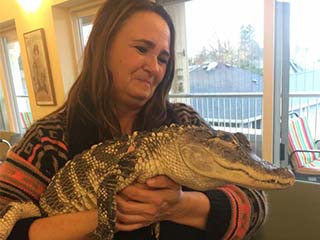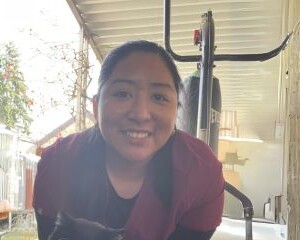Veterinary Assisting Lead Instructor Pammie Payne Leads by Example, Sharing Lifelong Love for Animals with Spokane Students
 When singer Marc Anthony said “Do what you love and you’ll never work a day in your life”, he could very well have been thinking about Pammie Payne.
When singer Marc Anthony said “Do what you love and you’ll never work a day in your life”, he could very well have been thinking about Pammie Payne.
For nearly 40 years, Pammie has channeled her passion for animals into an eclectic career that has encompassed working in veterinary clinics and animal hospitals, and serving as an animal care specialist for the Oregon Wildlife Foundation and Northeastern Wildlife. For the past 18 years, she has also been lead instructor at Carrington’s Veterinary Assisting program in Spokane, Washington.
We talked with Pammie about her love for animals, her long teaching career, and the most important lesson every Veterinary Assistant must learn:
Have you always been an animal lover?
Always! My mom used to get upset when was little because I wanted to play with snakes and frogs. But even back then, if it moved, I loved playing with it and taking care of it!
How many pets do you currently have?
I have a miniature poodle, ferrets, frogs, and an alligator named SeeMoreTeeth. He’s a sweet beast. I’ve had him 13 years and he’s grown to be five feet long. He lives in a nine-foot round swimming pool. He loves my granddaughter and vocalizes when he sees people he knows. People always ask if I’m afraid he’ll bite me. He’s never tried. He eats bait fish and has a great life. SeeMore has even visited nursing homes for educational presentations I occasionally conduct.
What is a typical day like for you?
I’m currently teaching four classes with a total of 32 students. A new class begins every six weeks, so there’s always something happening. I’m currently on campus two days a week and I also tutor remotely. I leave my home in Kellogg, Idaho at 4:30 a.m. and drive through the mountain pass into Washington. It’s 130 miles round trip. I rarely run into traffic, but snow can be an issue—and I always have to be on the lookout for deer, elk or moose crossing the road. I just allow plenty of time and enjoy the beautiful scenery.
The other days, I work from home. Organizing and managing our externship program also requires a lot of time and energy. Students in our program do a last-term externship at area veterinary clinics. I also coordinate with Carrington’s Career Services team to help place students in jobs after they graduate.
What is the biggest misconception students have to overcome when they begin your program?
I think many students initially assume that they’ll only be providing care to dogs and cats. Over my years as a Vet Tech, I’ve taken care of dozens of different species—everything from giraffes, rhinos and a Siberian lynx to ferrets, guinea pigs, skunks, woodchucks, and rabbits. A lot of people would also be surprised at how many reptiles—turtles, lizards, snakes and crocodiles—are taken to vets for care.
Once they graduate from your program, what are Veterinary Assistants prepared to do?
After completing our program, students are prepared for the clinical, lab, and administrative duties required of a Veterinary Assistant. They’ve learned animal anatomy and physiology, nursing skills, pharmaceutical chemistry, and surgical skills. Veterinary Assistants help veterinarians and veterinary technicians provide preventive medicine and care for animals who are sick or injured. Their responsibilities include feeding and bathing animals to checking in patients, helping administer medication, monitoring animals after surgery, and cleaning and sterilizing surgical rooms.
You’ve been around people who work with animals for many years. What types of people tend to be attracted to veterinary professions?
My experience is that people who are drawn to the veterinary professions tend to be, by nature, gentle and nonjudgmental. Animals love unconditionally and can provide great comfort to those who have experienced trauma in their lives, and people often have a strong desire to return the favor.
What skills or qualities do good Veterinary Assistants possess?
I’ve found that many people are attracted to veterinary care and medicine because they like animals more than people. They often overlook the reality that you’re actually dealing with people all day. I think that’s the most important lesson new Veterinary Assistants must learn: you’re in the people business as much as you’re in the animal business. Every animal you see comes with a person who cares about that animal, who often has strong opinions, and who ultimately has to pay for the services and care you’re providing. Sadly, people are not always rational or even nice. Veterinary assistants and technicians have to be thick-skinned and be able to manage their emotions. You can’t carry whatever happened during your last appointment into the room next door.
What would you say to someone who might be considering becoming a Veterinary Assistant?
If you love animals, get along with people, can deal with crises and enjoy an active, fast-paced environment where no two days are ever the same, it could be a very rewarding career for you!


